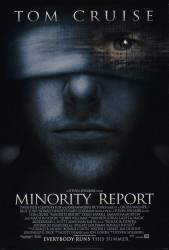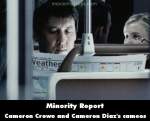Revealing mistake: When Anderton first sees himself killing Leo Crow in the precog vision, pay attention to the shot when he says "no". The reflection of Jad in the Hi Tech screen doesn't match with his movements.

Minority Report (2002)
1 revealing mistake
Directed by: Steven Spielberg
Starring: Tom Cruise, Colin Farrell, Max von Sydow, Neal McDonough, Samantha Morton, Steve Harris
Plot hole: Anderton's wife gains entry into the jailhouse using her husband's eyeball - but he's already locked up inside, so his eye would not still have access to enter as it pleased. Any place anywhere that would have any sort of security system requiring anything from a simple passcode to a card key to a retinal scan, would immediately delete the user in such instances from all rights. And would also certainly report on any attempted use of such (retinal scan, pass code, whatever). (02:00:45)
Iris Hineman: If the unintended consequences of a series of genetic mistakes and science gone haywire can be called 'invention', then yes, I invented Precrime. (00:57:50)

Trivia: On the "subway" train, the man holding the USA Today paper is Cameron Crowe, and the woman in the seat behind him on his left is Cameron Diaz. Because "Vanilla Sky" and "Minority Report" were so close in shooting, the two directors (Crowe and Spielberg) agreed to put themselves as cameos in each other's films. (00:46:10)
Question: There's a quote that I don't understand: "The fact that you prevented it from happening doesn't change the fact that it was going to happen." I immediately thought, "Yes, it does change the fact that it was going to happen." If Witwer hadn't put his hand there, it would have happened. However, he did, thus "changing the fact that it was going to happen," right? Isn't this the point of the whole movie: determinism is foolish and that different actions produce different consequences?
Answer: No, he didn't change the fact that it was going to happen. He prevented it from happening. But until he stopped it, it was going to happen. And no matter how many times you look back at that sequence, it was going to happen. Up until a point, it was going to happen. It was just prevented.
Answer: The statement involves the idea of arresting people who did not commit the crime yet but are going to. Until the precogs tell someone to change things, the idea is that it will happen. If Anderton had rolled the ball and the other guy was not watching, it was going to fall. The only way to change it would have been for Anderton to say something. Things will happen unless the future is changed. Ultimately the idea is proven sketchy at the end at best.
Join the mailing list
Separate from membership, this is to get updates about mistakes in recent releases. Addresses are not passed on to any third party, and are used solely for direct communication from this site. You can unsubscribe at any time.
Check out the mistake & trivia books, on Kindle and in paperback.




Suggested correction: I thought that this was a mistake as soon as I saw it on screen, but reconsidered. It's perfectly possible that there was some, probably human caused, delay in updating the security system. After all, there wasn't a rush to do it since they already had the chief on ice. Maybe the sleep jail was still on a legacy system without automatic updating. Just assuming that in the near future that all systems are all perfectly integrated and instantaneous does not validate this as a mistake.